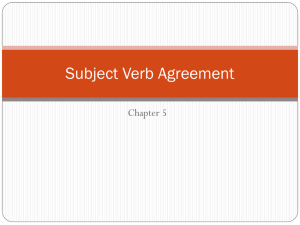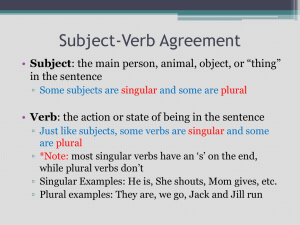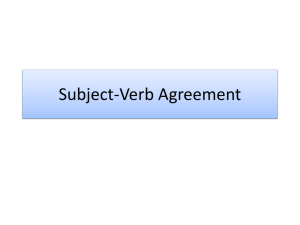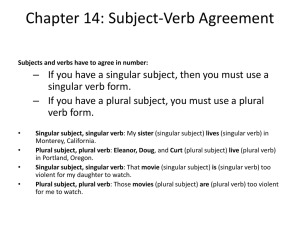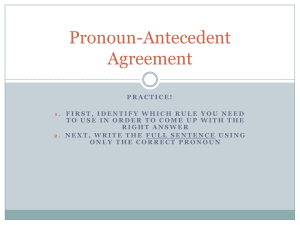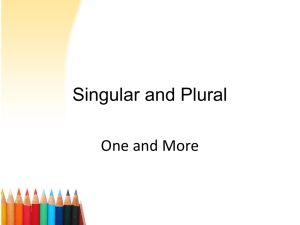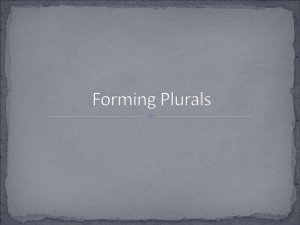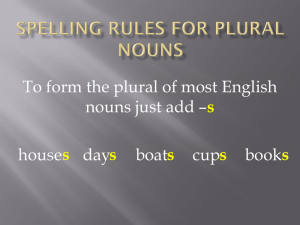Grammar Basics: Part 2 - School of Social Work
advertisement
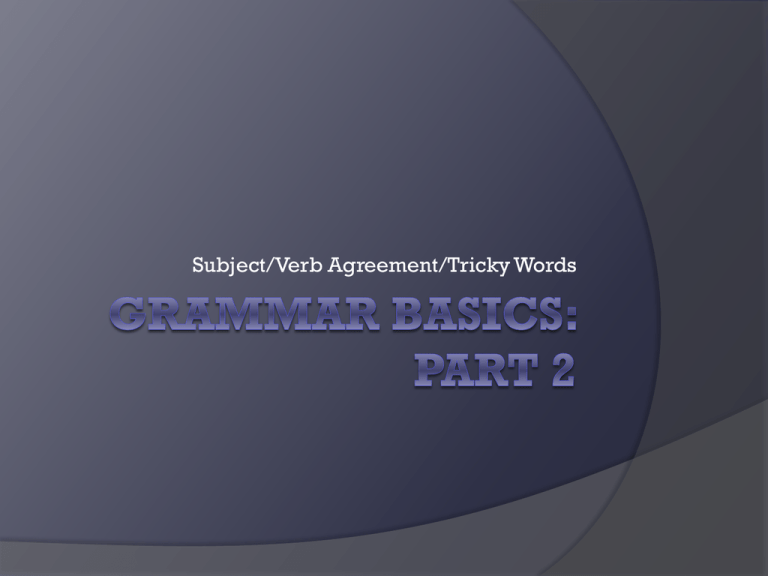
Subject/Verb Agreement/Tricky Words Make sure the subject agrees with the verb The girl [singular subject] reads [singular verb] mystery stories. The girls [plural subject] read [plural verb] mystery stories. Tonya [singular subject] is [singular verb] asleep. Tonya and her friends [plural subject] are [plural verb]. Don’t be confused by plural words that come after the verb. Wrong: My biggest problem are the many incomplete homework assignments I need to finish. Right: My biggest problem [singular subject] is [singular verb] the many incomplete homework assignments I need to finish. Don’t be confused by plural words that come between a singular subject and verb Wrong: The topic of these four books are horses. Right: The topic [singular subject] of these four books is [singular verb] horses. Wrong: Each of the bikes have new tires. Right: Each [singular subject] of the bikes has [singular verb] new tires. Don’t be confused by subjects that come at the end of the sentence. Wrong: Standing at the back of the room was my parents. Helpful tip: Switch sentence around: My parents were standing at the back of the room. Right: Standing at the back of the room were [plural verb] my parents [plural subject]. Wrong: At the end of most of our team’s games come victory’s sweetness. Right: At the end of most of our team’s games comes [singular verb] victory’s sweetness [singular subject]. Don’t be confused by phrases such as along with, together with, accompanied by, as well as, including, and in addition to. Wrong:Tenita, as well as Ping, play basketball well. Right: Tenita [singular subject], as well as Ping, plays [singular verb] basketball well. Wrong: Broccoli, in addition to squash and all other vegetables, are good for you. Right: Broccoli, [singular subject], in addition to squash and all other vegetables, is [singular verb] good for you. Collective Nouns: Amounts and Numbers A collective noun denotes a group of something: a family, herd, team, majority, etc. Even though the noun suggests more than one person it can be singular or plural depending on how it is used in the sentence. This class [singular subject] is [singular verb] in session. (The class is referring to the whole, so it is a singular unit .) The class [plural subject] are [plural subject] taking their test. (The class, in this context, refers to each individual taking their test and is plural.) Wrong: The jury are returning with their decision. (Juries always operate as a whole when they make decisions.) Right: The jury [singular subject] is [singular verb] returning with its decision. Numbers Ten dollars [singular subject] is [singular verb] the entry fee. (Ten dollars is considered one amount of money). Six months [singular subject] is [singular verb] needed to complete the assignment. (Six months, in this sentence, is considered one unit of time). Ten dollars [plural subject] were [plural verb] tucked under my bed. (Each individual bill is counted as the subject making it a plural subject.) Six months [plural subject] have [plural verb] passed since the assignment. ( In this context, six months is considered six individual months). Everybody, Anybody and Everybody Wrong: Every one of the members of both basketball teams are here. Right: Every one [singular subject] of the members of both basketball teams is [singular verb] here. Even though these words represent plural subjects, they are grammatically singular. Tricky Words: Effect/Affect Effect as a noun=the result or outcome of something. If you don’t wear your bicycle helmet, the effect could be very bad. Effect as a verb=to cause or to bring something into being. The teacher tried to effect a change in the students’ study. Affect Affect as a noun: emotions (a very rarely used word except by psychologists) The child’s affect was very disturbed after she saw the scary movie. Affect as a verb: to influence something The movie didn’t affect me as much as it did my little sister. When to use effect… If it’s a noun you need, always choose effect (unless you’re a psychologist talking about emotions). Scary movies have a bad effect on many kids. My apology didn’t have the effect I thought it would have. When to use affect… If it’s a verb you need, affect is the right choice 90 percent of the time. To be sure, substitute the words cause and influence, and see which is better. Affect=Influence Effect=Cause Right: Too much rainy weather affects [influences] my mood; it makes me grumpy. Right: Too much rainy weather from the hurricane effected [caused] flooding and beach erosion. Other Tricky Words… All right or Alright? A lot and alot? Alright is not a word. You may see it a lot, but it does not exist. Alot is also not a word. Wrong: It is not alright to write this way. Right: It is all right to write this way. Wrong: This is a goof that students make alot. Right: This is a goof that students make a lot. References Elliot, R. (2006). Painless Grammar. New York: Barron’s.
